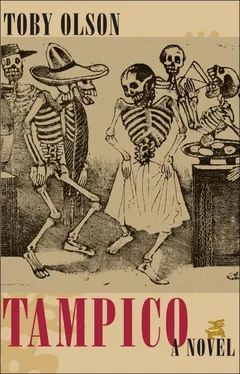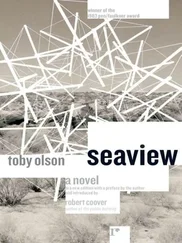I could see the escarpment far below, and the beach and the tree in the surf in phosphorescence, but I could see nothing of the cliff face, the opening and the stairway. They were back behind me, somewhere under the ground I’d passed over, and I stepped away from the edge, counting two steps, then stood in the moonlight calculating. Then I paced off the distance, somewhat unsure of it as I stepped over surface roots and struggled through the oak branches. I was ten feet from the house side when I counted the final number, and I stood there looking at the clapboards and the windowsills they butted against. I moved ahead and got down on my knees, dragging the rope at my side, and pressed the dead grass flat at the foundation with my free hand, then crawled along it, digging my fingers into the earth where it met cement. I was near the rear of the house when my hand slipped in and I found I could reach down along the foundation up to my elbow. The earth had pulled away from cement there, and though the house cast a shadow down over me and I couldn’t see well, when I turned my hands palm down beside each other to measure the space, there was nothing on either side of them but air.
I lifted the rope from where I’d pushed it against my knee to feel it and keep it close, then climbed up to my feet and looked back along its length. It hung in a sinking arc, brushing the clapboards like a jump rope, and I could imagine it caught up under a board, the rough wood then fraying it and its strands unraveling. I felt the flush rise in my cheeks then, and I pulled at the rope, snapping it taut. It was still firm at the pillar, and gripping it like a lifeline, I carefully coiled it, concentrating on the act, as I moved hand over hand until I had reached the porch, where I dropped it, and then stepped back through the screen and into the safety of the house.
Last night, after Arthur had driven me home from the Manor and I was undressing at the foot of the bed, I looked over and found I couldn’t see the betta gliding in the illuminated azure water of the tank. It was damp in the room and I was sweating. The wind had turned and was coming in cool from the northeast, a promise of dry air behind it, and I was shivering in my underwear as I crossed to the tank, then stood beside it and looked down into its waters and saw the betta floating there, like a piece of undulating sea lettuce on the surface the bubbles stirred into wake, his body shaped by the swells.
I reached around the tank and turned the handle of the valve, and the water settled into stillness, and then his body was still, in the shape of a perfect cutout, a glossy image lifted from the pages in a magazine of exotic sealife photography, the bands of startling colors even more distinct than they had been in life when he was always moving, the bands widening into pastels as they expanded and bled into each other, heading toward that translucency at the tips of the broad and extended display of his fins, the entire spectrum radiating out from an electric red and blue center of pigment on the impossibly wide field of his still body.
My arms were damp with moisture where they hung at my sides, and I could feel the beginnings of a soaking wetness where the edges of my underwear touched my body. I was shaking in the cool breeze coming in from the open window to seaside, and I left the tank and went to the bathroom to get my robe and slippers, then walked down the hallway and into the kitchen, where I searched the drawers to the side of the sink, finding the small, handheld strainer in the bottom one. It was a flat strainer, one my mother had seldom used. It had a thin wooden handle that ended in a circle of wire mesh that was as dense as a window screen, and once I’d worked it out from where it was tangled in the thick electrical cable of the old mixer, I rinsed it in the sink, then carried it out in the air at my waist as I walked back to the bedroom and the tank.
The betta was as I’d left him, his colors and the scalloped texture of skin below them still vibrantly alive. His mouth was closed, stolid beyond any attitude or conviction in the way he often held it while swimming, and it was only his stillness and a milky glaze over the small round dome of his eye that signaled his death. I realized I didn’t know when he had died, couldn’t quite remember having seen him the night before when I had fed him. I couldn’t remember talking to him, not for a good long while, since those first few days following the death of his mate, and I was troubled by this and by the sight of the dead, as if the fish were waiting there in some limbo, poised near the beginning of transit, unnaturally, waiting for me to set the world right and send him on his way.
I dipped the strainer into the still water near the tip of the betta’s extended bottom fin, insinuating it down and under the fish carefully so as not to disturb him, and when the handle and my fingers were in the water too, I raised the strainer and the fish settled in the circle of wire mesh as I lifted it, then held it just inches above the surface as he drained, losing his color.
At first I thought it was the northeast air in the room, washing the humidity away, drying and dulling the glossy surface, but it was not that. The bands of color were moving, drifting away from the center, slipping over the low domed body of the fish out toward the edges, then falling through the wire mesh of the strainer down to the still surface below. And the center was growing colorless and grey now, an expanding field of grey, redefining the shape of the fish as the bands thinned and expanded and washed over each other, shimmering in bright new hues at the edges, outlining the fish in moments of neon. Then it was over, and the betta lay in the circle of mesh, drained of his personality, and I stood holding him and looking down at him as if he held some universal message. Then I moved the strainer to the side and saw the ghostly figure on the water.
The betta’s colors had fallen into a ragged image of itself, and as the water swelled slightly from the flooding they were reconstituting, forming the shape of the fish again, a wavering spirit image, that even as I watched was dissolving, floating away from the center to become an aura of blues and greens that slowly faded into a vague phosphorescence that blinked out finally in the azure surface.
I brought the fish back over the empty water and gazed down at his embryonic figure, a simple oval shape now, before display of color, those flags of filament at fin tips, before breath swelling his sides, narrowed to a knife edge in exhalation and gliding. But it was no embryo, though it left life, as is said, as it came into it, emptied of its world’s face, that specific and yet generic one, the body picture given up to commerce with its own kind and the particularity of color pattern that distinguished it among others.
I saw then another face as I gazed down, watching the betta’s body as it faded to a lighter grey in the cool, dry breeze, then turned white and became the image of a medallion carved from ash, so smoothly fashioned that its scalloped surface seemed translucent. Its skin shimmered as the last moisture left it, then stretched tight over its body in a kind of rigor mortis. Then even that final scalloped patterning was gone, and I could see through its skin, as through glass, down into the dense meat and those impressions in it that were the bones of its universal skeleton, a structure that even as I watched seemed to be rising, shedding flesh and ligament and tendon, and the juice in the synapses of its primitive brain.
I thought then of the calaveras I’d heard mention of in John’s story, his voice rising in enthusiasm and drifting into the instrument room where I was cleaning the tracheotomy tubes and their cannulas. The tubes were intrusion, but they were means to a last connection, possibility of that air rising around them to be shaped into words, and then stories.
Читать дальше












